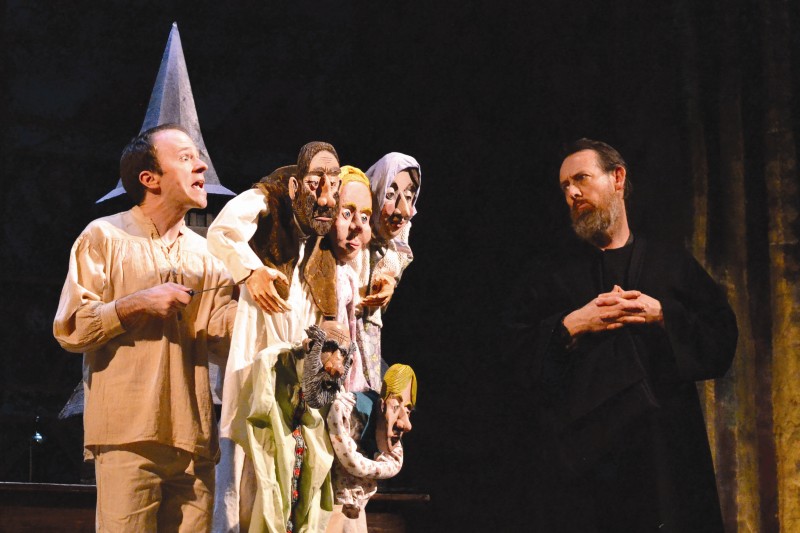 Anyone who has stepped into Wilton’s music hall will know the majesty of the place. The building alone, imbued with the history of decades of countless performances, is riddled with a tingling theatricality. Father Nandru & The Wolves is the last large performance that it will hold before it undergoes a period of renovation, and the piece certainly does its best to live up to the prestige of the venue.
Anyone who has stepped into Wilton’s music hall will know the majesty of the place. The building alone, imbued with the history of decades of countless performances, is riddled with a tingling theatricality. Father Nandru & The Wolves is the last large performance that it will hold before it undergoes a period of renovation, and the piece certainly does its best to live up to the prestige of the venue.
This puppetry piece is written and directed by experienced fringe playwright Julian Garner, and it’s an old folk tale inspired by true events that winds up with some very contemporary concerns. It is told in rhyming verse with puppets made by Hannah Horte (Pickled Image) that are quite striking and reminiscent of Peter Schumann’s Bread and Puppet theatre.
It is the story of a village in Transylvania in which there is a small church presided over by Father Nandru. He is our guide through the story, and only character perfumed solely by an actor, as a disfigured girl and a gypsy get married, and the government seek to develop their village and threaten the church with demolition. All the while this main narrative is punctuated by stories of and the arrival of the wolves who act as sort of spiritual guides to watch over the proceedings.
There is much to be commended in this performance; the design of the puppets, the lighting and sound are all great. The music too, which is played live by a genuine three piece gypsy band from Transylvania. Also some of the large set pieces are very impressive indeed.
But there are some crucial elements left neglected that drain any magic from the piece and stop it from being the awe-inspiring performance set up by its premise. This is first evident in the opening minutes of the show when one of the wolves wanders on stage in a pantomime cow fashion while Father Nandru looks on and feigns fear. In one early and devastating miss-step any mysticism surround the show’s key symbol has been drained away, and it never quite recovers. I felt alienated quite early, in a moment that could just as easily have been electric.
The main element that holds the piece back however is the tyrannical grip of the text. The rhyming verse quickly becomes suffocating and the repetitive rhythm had me playing ‘guess the approaching rhyme’. The quality of the language deteriorates as it becomes more concerned with sticking rigidly to the form than with telling the story well. There are more words than there need to be, and all too often the frankly mundane choice of rhymes stripped away any magic or even presence of character.
The puppets too are subjugated by the text and are treated merely as little actors. They are doomed to trot on, speak and get dragged off, denying them any chance to add the air of wonder that the piece desperately craves. What’s worse is some of the puppeteering. With a few notable exceptions, the puppeteers speak as if their puppets were not theirs at all and act over them. Puppets are left dangling in mid air without due cause or they are strewn lifeless over the set. It’s enough to make a puppeteer’s toes curl, and it seriously undermines the credibility of this as a ‘puppet piece’ as it doesn’t feel as if the director has a great deal of sensitivity or imagination for the form. Indeed it is all too obvious that the director is also the writer, as all the focus is on the text.
Quite regrettably, by the end these mounting grievances had suffocated my empathy. Which is a shame because I wanted to care so much: as the story wanders into the uncertainty of the future in a world bent on modernisation, it resonates well with the true to life story of the building itself. But even though the packed audience rewarded the cast with long and healthy praise, ultimately I left feeling disappointed for thought of what, with a little more performance craft and magic, might have been.
